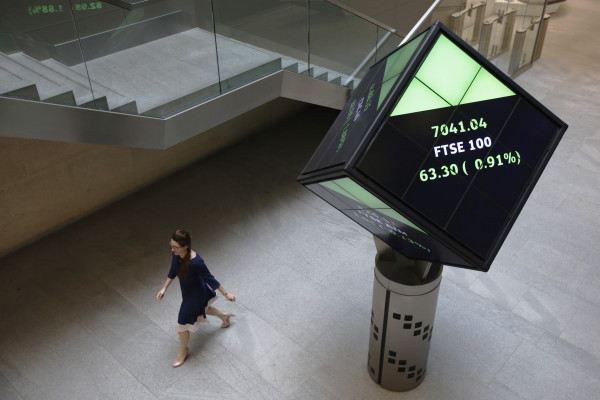

Global markets have jumped this afternoon on further hopes of a successful vaccine for the coronavirus.
The FTSE 100 is up nearly 2 per cent since midday, when Moderna announced its vaccine was nearly 95 per cent effective in protecting people from all age groups against Covid-19.
The US-based company, which plans to apply for approval in the next few weeks, said it was a “great day”.
Although less of a rise, it mirrored last week’s events when the FTSE 100 surged 4.2 per cent after Pfizer and BioNTech announced preliminary analysis which showed their vaccine was 90 per cent effective in their latest round of trials.
Businesses thwarted by the global pandemic — such as International Consolidated Airlines (BA’s parent company), Rolls Royce and energy firms like Shell and BP — drove the UK’s blue chip index skyward once again.
ICA’s share price is up 12 per cent today, Rolls Royce's is up 10 per cent while BP and Shell both saw gains of around 6 per cent.
Similarly to last week, industries which have prospered amid the coronavirus crisis, including online food delivery service Ocado and takeaway service Just Eat, have gone the other way, falling 4 and 3 per cent respectively.
Other markets in Europe have made similar gains. The Euro Stoxx 50 is up 1.5 per cent since the announcement while Germany’s DAX is up more than 1 per cent.
Susannah Streeter, senior investment and markets analyst at Hargreaves Lansdown, said: “This is early data and the Moderna vaccine isn’t likely to be approved for at least another few weeks but the announcement adds to the confidence washing through the financial markets.”
According to Seema Shah, chief strategist at Principal Global Investors, the global population “couldn’t have asked for more” from the Moderna vaccine.
Moderna’s version can be stored at minus 20 degrees for up to six months and can be stored in a standard fridge for up to a month — significantly more logistically feasible than Pfizer’s, which needs ultra-cold storage at around minus 80 degrees and will last five days in a normal fridge.
Ms Shah said: “With an almost 95% efficacy and more acceptable logistical and storage dynamics, today’s news should solidify the market rally that has been in play since last week.
“Visibility towards a return to normality is increasing, and this should provide more fuel to the reflation rally, with small caps, value and cyclicals clear beneficiaries.”
imogen.tew@ft.com
What do you think about the issues raised by this story? Email us on fa.letters@ft.com to let us know.




